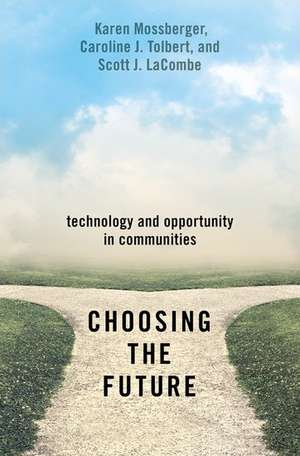Choosing the Future: Technology and Opportunity in Communities
Autor Karen Mossberger, Caroline J. Tolbert, Scott J. LaCombeen Limba Engleză Paperback – 12 oct 2021
Preț: 163.17 lei
Preț vechi: 187.94 lei
-13% Nou
Puncte Express: 245
Preț estimativ în valută:
31.22€ • 32.67$ • 25.94£
31.22€ • 32.67$ • 25.94£
Carte disponibilă
Livrare economică 03-08 martie
Preluare comenzi: 021 569.72.76
Specificații
ISBN-13: 9780197585764
ISBN-10: 0197585760
Pagini: 240
Dimensiuni: 236 x 157 x 15 mm
Greutate: 0.36 kg
Editura: Oxford University Press
Colecția OUP USA
Locul publicării:New York, United States
ISBN-10: 0197585760
Pagini: 240
Dimensiuni: 236 x 157 x 15 mm
Greutate: 0.36 kg
Editura: Oxford University Press
Colecția OUP USA
Locul publicării:New York, United States
Recenzii
The United States is embarking on a major transformation through infrastructure. The timely research in this volume on broadband access, inclusive innovation, smart cities, and the future of work will comprise a vital source of knowledge and direction for policy makers, researchers, and those building our future. With their usual rigorous attention to detail, the authors explain in depth how inclusive broadband and digital human capital comprise essential dimensions of infrastructure for economic wellbeing.
This data-intensive and rigorously evidence-based book conducts a forensic examination of the digital drivers of innovation and inequality in communities across the US over 20 years. Given the growing need for digital innovation—and the spiralling importance of digital inequality—during the pandemic, it could not be more timely. Society needs this book!
Choosing the Future intelligently grapples with the complicated intersections of technology, opportunity, and innovation. It's a timely book about subjects that will occupy us for the duration of the 21st century. Giving life to the phrase human capital, the authors combine data on broadband use with on-the-ground stories to begin to explain where inequality has been and is headed in the future. I highly recommend this to social planners, scholars, and policymakers trying to come up with the tools to solve the most pressing problems of work, education, and community.
The impact of technology on inequality is one of the most important challenges facing the US. In this book, Mossberger, Tolbert, and LaCombe compile extraordinary broadband data over nearly two decades to show wide and persistent inequalities. Their analysis is a tour de force that should be read by those in government, business, and academia. Their recommendations on ways to reduce inequality should be taken seriously by all.
This data-intensive and rigorously evidence-based book conducts a forensic examination of the digital drivers of innovation and inequality in communities across the US over 20 years. Given the growing need for digital innovation—and the spiralling importance of digital inequality—during the pandemic, it could not be more timely. Society needs this book!
Choosing the Future intelligently grapples with the complicated intersections of technology, opportunity, and innovation. It's a timely book about subjects that will occupy us for the duration of the 21st century. Giving life to the phrase human capital, the authors combine data on broadband use with on-the-ground stories to begin to explain where inequality has been and is headed in the future. I highly recommend this to social planners, scholars, and policymakers trying to come up with the tools to solve the most pressing problems of work, education, and community.
The impact of technology on inequality is one of the most important challenges facing the US. In this book, Mossberger, Tolbert, and LaCombe compile extraordinary broadband data over nearly two decades to show wide and persistent inequalities. Their analysis is a tour de force that should be read by those in government, business, and academia. Their recommendations on ways to reduce inequality should be taken seriously by all.
Notă biografică
Karen Mossberger is the Frank and June Sackton Professor in the School of Public Affairs at Arizona State University, and director of the Center on Technology, Data and Society. Her research includes digital inequality, digital government, and impacts of technology use, for individuals and communities. In other work she has examined issues in urban policy, local governance, and policy innovation. Her co-authored and edited books on technology include Digital Cities: The Internet and the Geography of Opportunity, Digital Citizenship: The Internet, Society, and Participation, Virtual Inequality: Beyond the Digital Divide, and Transforming Everything? Evaluating Broadband's Impacts Across Policy Areas (Oxford 2021). She is an elected fellow in the National Academy of Public Administration.Caroline J. Tolbert is the Lowell Battershell University Distinguished Professor of Political Science at the University of Iowa. Her work is driven by a theoretical and normative interest in strengthening American democracy and fostering inclusive economic growth. Her research and teaching weaves together a concern with diversity and inequality, elections and representation, technology policy and local economic development, subnational politics and policy, and data science. She is the coauthor of Accessible Elections: How the States can Help Americans Vote (Oxford, 2020). She has co-authored three books on the internet and politics/policy, including Digital Cities: The Internet and the Geography of Opportunity, Digital Citizenship: The Internet, Society, and Participation, and Virtual Inequality: Beyond the Digital Divide. Her research has been funded by the National Science Foundation, and numerous private foundations.Scott J. LaCombe is an Assistant Professor of Government and Statistical and Data Sciences at Smith College. His research focuses on public policy and the politics of US states. He particularly focuses on the spread of public policies across US states and how these adoption decisions are structured by state political institutions. His research also focuses on using big data to answer questions about subnational governments, and he is part of several projects to collect data on tens of thousands of state policy adoptions including the State Policy Innovation and Diffusion Dataset, and he has published in Policy Studies Journal, Political Research Quarterly, and State Politics and Policy Quarterly.
